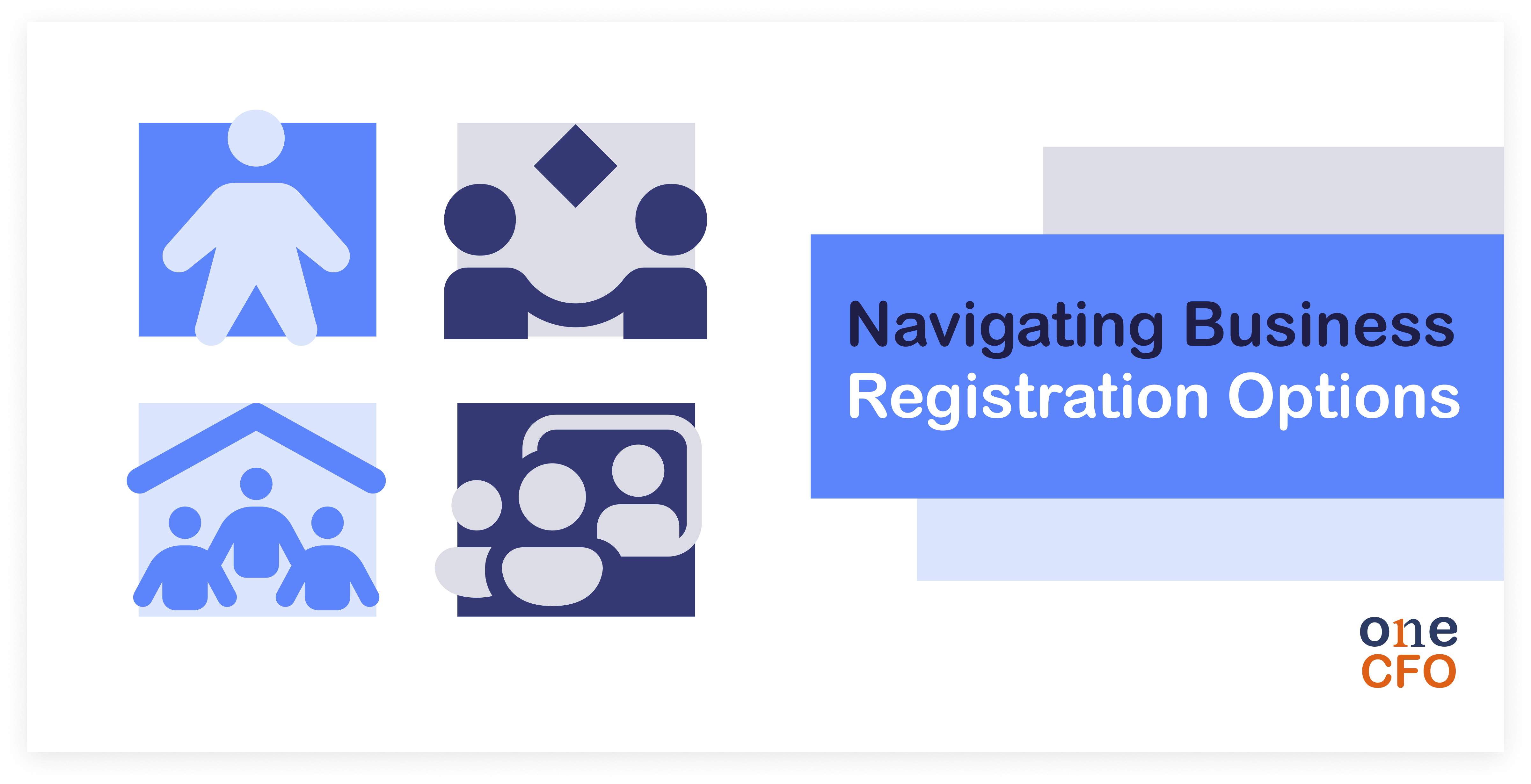
October 3, 2023 | 8:45 pm
Besides a viable product or service, selecting the right legal business structure is
essential when starting a business. In the Philippines, you may register your business as a
sole proprietorship, partnership, corporation, and one-person corporation or OPC. But which
one is the best option for your business?
Choosing among the four common business structures in the Philippines dictates where you
register your business, the additional requirements, taxes, and the extent of liability.
Furthermore, registering your business is not just a legal requirement for business in the
Philippines. It is a strategic step that enhances credibility, fosters trust, and unlocks
market opportunities.
In this guide, we’ll explore the different legal business structures, shedding light on the
‘why” behind ‘what’ you choose. Read on to make informed decisions that will be your
passport to legitimacy and success.
What does business legal structure mean?
A business legal structure is a classification the government requires all businesses to
have upon registration. It establishes the framework that defines its ownership, management,
tax obligations, and legal responsibilities within the eyes of the government.
Entrepreneurs must thoroughly evaluate their business goals, size, and risk tolerance to
determine the suitable business registration option for their venture.
4 Types of Legal Business Structure
Once you have a business idea and business plan, it’s time to register your business. But
before doing so, you must choose the appropriate structure for your company.
Here are the four types of business structures to choose from:
Sole Proprietorship
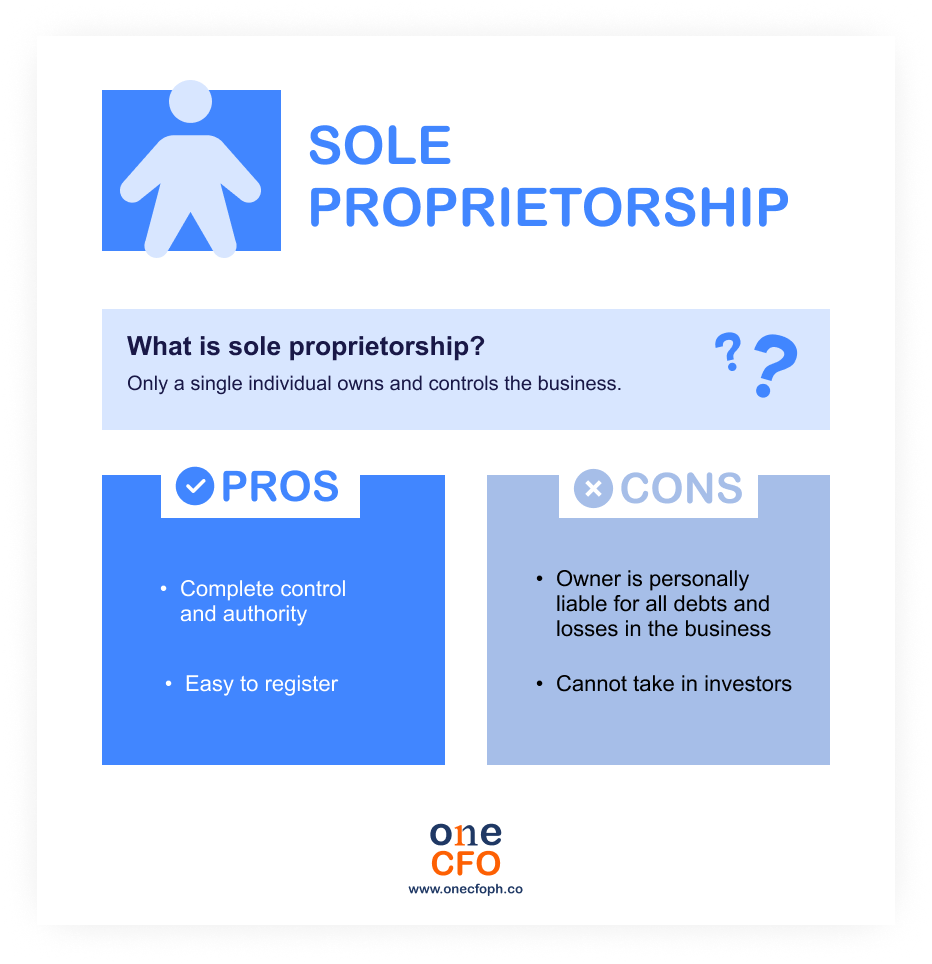
A sole proprietorship is the most common
type of structure since it's also the simplest to
set up. Only a single individual owns and controls the business in a sole proprietorship.
Regarding taxes, the owners pay income tax at either a graduated
rate or an 8% rate. The
graduated tax rates range from 0% to
35% depending on the taxable income, while the 8% rate
only applies to those with yearly gross sales or receipts below Php 3,000,000.
To register a sole proprietorship, the business owner needs to go through the Department of
Trade and Industry (DTI), the local government units (LGU), and the Bureau of Internal
Revenue (BIR).
Advantages
The main advantage of sole proprietorships is that owners have complete control over the
business. All final business decisions will come from them, and they get to keep and manage
the profits.
Another pro is it’s the easiest one to register. Compared to the other business structures,
sole proprietorship has the least paperwork - all you need to do
is apply for a name with
DTI, get the necessary permits from the LGU, and register it with the BIR.
Disadvantages
The main disadvantage of sole proprietorships is that owners have no protection from the
business’s liabilities, as they are fully liable for all debts and losses incurred.
Financial institutions can legally seize personal assets when the business suffers losses or
goes into debt.
Sole proprietorships also can’t distribute shares, making it hard to attract investors. You
can use other means like bank loans to fund your business.
Partnership
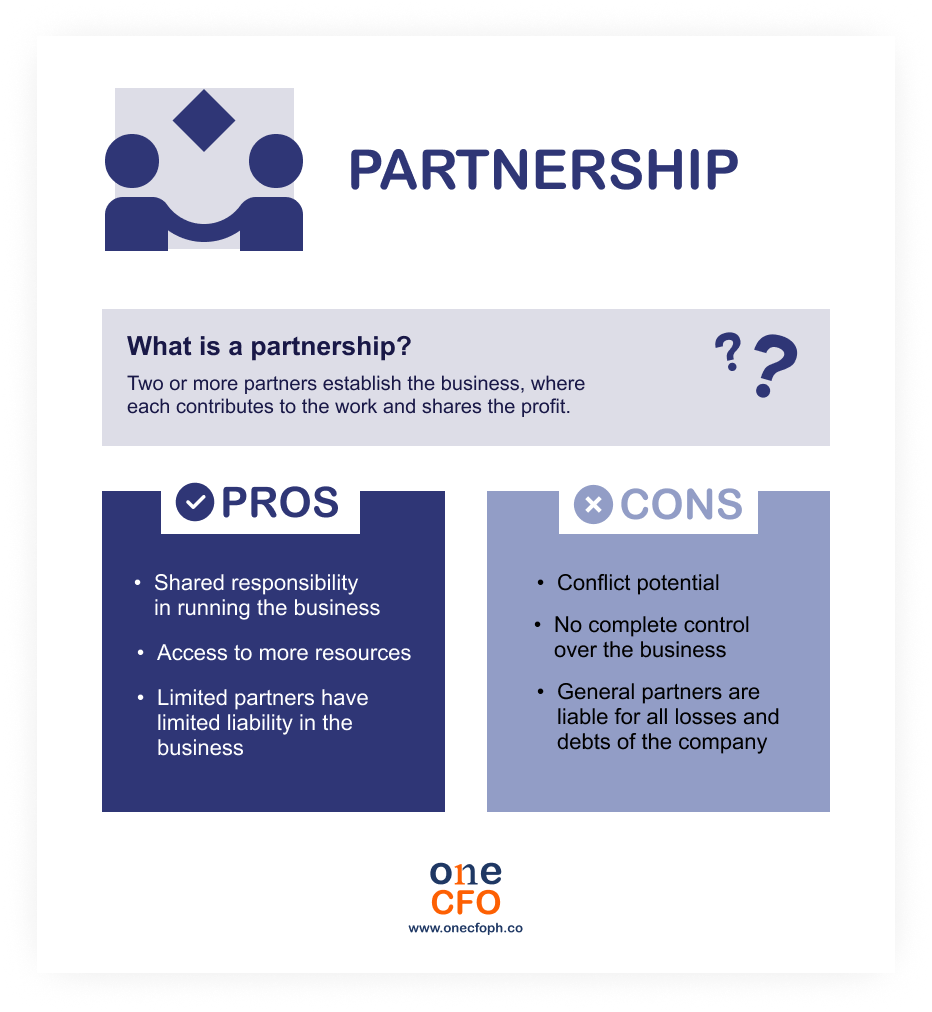
If you start a business with at least one more person, where each contributes to the work
and shares the profit, then your business structure is a partnership.
In a partnership, each partner agrees to contribute money or service and gets a share of the
profit according to their capital contribution. Similarly, the partners distribute any
losses in the same proportion they share the profits.
Additionally, partners are liable for taxes on the income they earn separately. For example,
once the partners divide the profits among themselves, the amount a partner receives is now
subject to income tax, which that partner should pay accordingly.
Common examples of partnerships are law firms, accounting firms, and physician groups.
Because providing licensed professional services bears much weight and responsibility, their
businesses can only be partnerships with unlimited
liability to their stakeholders.
Business owners who want to establish a partnership should register with the Securities
Exchange Commission (SEC).
What are the two types of partnerships?
A partnership has two types: general partnership and limited partnership.
In a general
partnership, the partners evenly divide the profits among themselves. General
partners play a role in managing the business’s operations, but they also bear unlimited
liability in the company.
Unlimited liability means if the company or another partner takes on debt, all general
partners are liable for it. The partners’ assets are also unprotected.
Meanwhile, partners are only liable for the amount of their contribution in a limited partnership.
Limited partners also don’t have any management rights to the business.
Advantages
An advantage of a partnership is you’re not alone in running the business. Partnerships
distribute the workload and decision-making among multiple individuals, reducing the burden
on one person.
Partnerships allow more resources. Partners can pool their financial resources and
expertise, potentially enabling the business to access more capital and talent. It also
helps if each partner has a different expertise, so one’s weakness can be another’s
strength.
For limited partnerships, limited partners enjoy the protection of their assets since
they’re only responsible for the amount of their investment.
Disadvantages
Differences in opinion and conflicts among partners can arise, potentially leading to
disagreements or disputes that may be challenging to resolve. It may also disrupt the
harmony within the business and potentially affect employee morale and overall
productivity.
You also don’t have complete control over the business in a partnership. Partnerships
require a consensus on major business decisions, which can slow down the decision-making
process.
While general partners enjoy more profits and control, they bear more risk as they have
unlimited liability. Each partner is responsible for the business’s debts and liabilities,
with their personal assets at risk.
Corporation
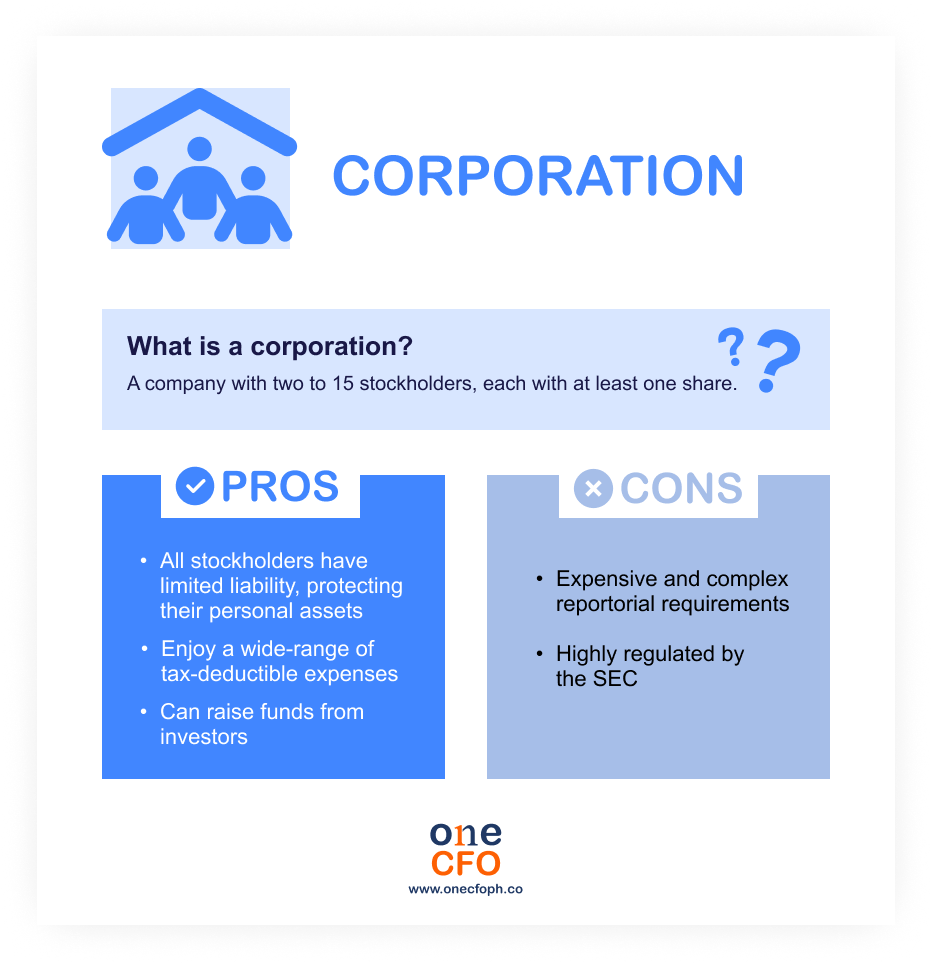
Another option for a business structure is a corporation. Starting a corporation
requires
two to 15 incorporators, each with at least one share.
A corporation is a separate juridical personality from the stockholders owning the
corporation. All stockholders enjoy limited liability as they are only responsible to the
extent of their shared capital.
Business owners register their corporations with the SEC. When establishing a corporation,
the SEC approves the authorized capital the company will
have, which is
the maximum amount
of shares the company can distribute.
Moreover, corporations are subject to a corporate income tax of up to 25%.
Depending on the
type of corporation, they may also be exempted from paying income tax. Corporations can also
use tax deductions to lower tax obligations.
What are the two types of corporations?
Corporations can be stock corporations or non-stock corporations.
A stock corporation is your typical
corporation, where the company divides the capital into
shares and distributes them to the investors. Each investor will receive a dividend and
portions of the excess profits, depending on how much they invested in the company.
On the other hand, non-stock corporations don’t issue
stock shares. Instead of a
shareholder, incorporators of non-stock corporations are called members. This type of
corporation typically exists for charitable, religious, and educational purposes.
Advantages
The most apparent advantage of a corporation is all stockholders have limited liability in
the business, which means their assets are protected.
Corporations can often deduct a wide range of business
expenses from their taxable income.
Certain corporations, like non-stock and non-profit educational
institutions, also enjoy
income tax exemption.
A corporation is excellent for businesses that want to grow quickly since they can raise
funds from investors. Being a corporation allows them to distribute equity to venture capitalists,
helping them scale their operations.
Disadvantages
A disadvantage of running a corporation is that it’s expensive and highly regulated. Registering a corporation and complying with reportorial requirements is complex and takes time and money.
One Person Corporation (OPC)
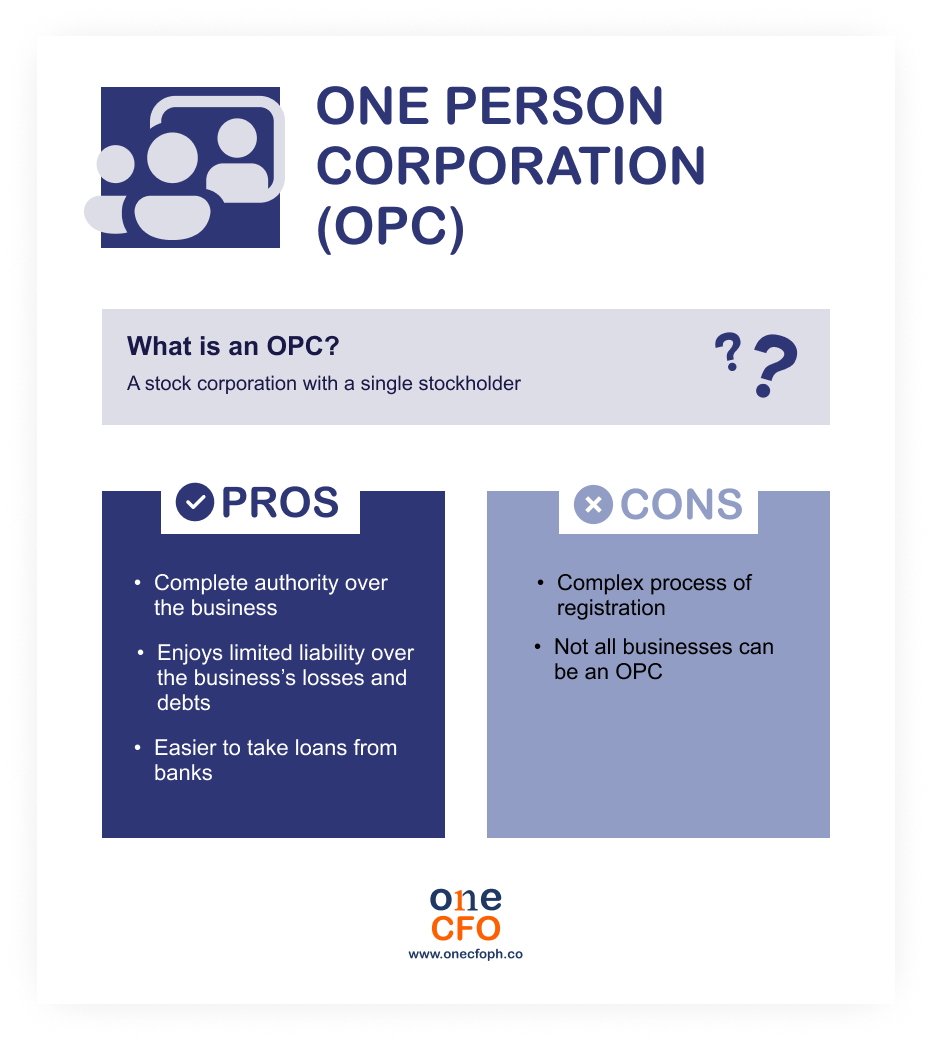
A one person corporation or OPC is a
stock corporation with a single stockholder. This
business structure is like the incorporated version of a sole proprietorship, where the
owner enjoys complete business control but has only limited liability.
When establishing an OPC, the owner acts as the company’s director and president. The owner
needs to identify a nominee and alternate nominee, the following persons in line to run the
business if the owner can’t fulfill the duties.
Being a corporation, a business owner should register the company under the SEC. They should
also comply with the other requirements the LGU sets and register with the BIR.
Advantages
Like sole proprietorships, the owner has complete authority over the company. The owners
mainly control all business decisions and the business's directions.
An OPC also benefits from a corporation's limited liability, which means the owner’s assets
are protected from the business’s liabilities.
Seeking funding is also easier since the formality of a corporation brings more credibility,
inspiring confidence from financial institutions. However, once there is more than one
stockholder in an OPC, they should convert their business structure to
a traditional
corporation.
Disadvantages
A disadvantage of OPC is its more complex registration process compared to sole
proprietorships. The additional paperwork can be a struggle, especially since the owner
operates alone.
Another con is that not all businesses can register as
OPC. Certain financial institutions
and professionals exercising their profession are not allowed to register as OPCs.
OPCs also can’t go public since it goes against the
nature of the
structure, where there’s
only one stockholder. Going public means a company can now sell shares or stocks to the
public to raise capital.
What is the best business structure for my business?
How you register your company plays a crucial role in the business's success. But how do you know which one is right for you? Here are some factors you need to check:
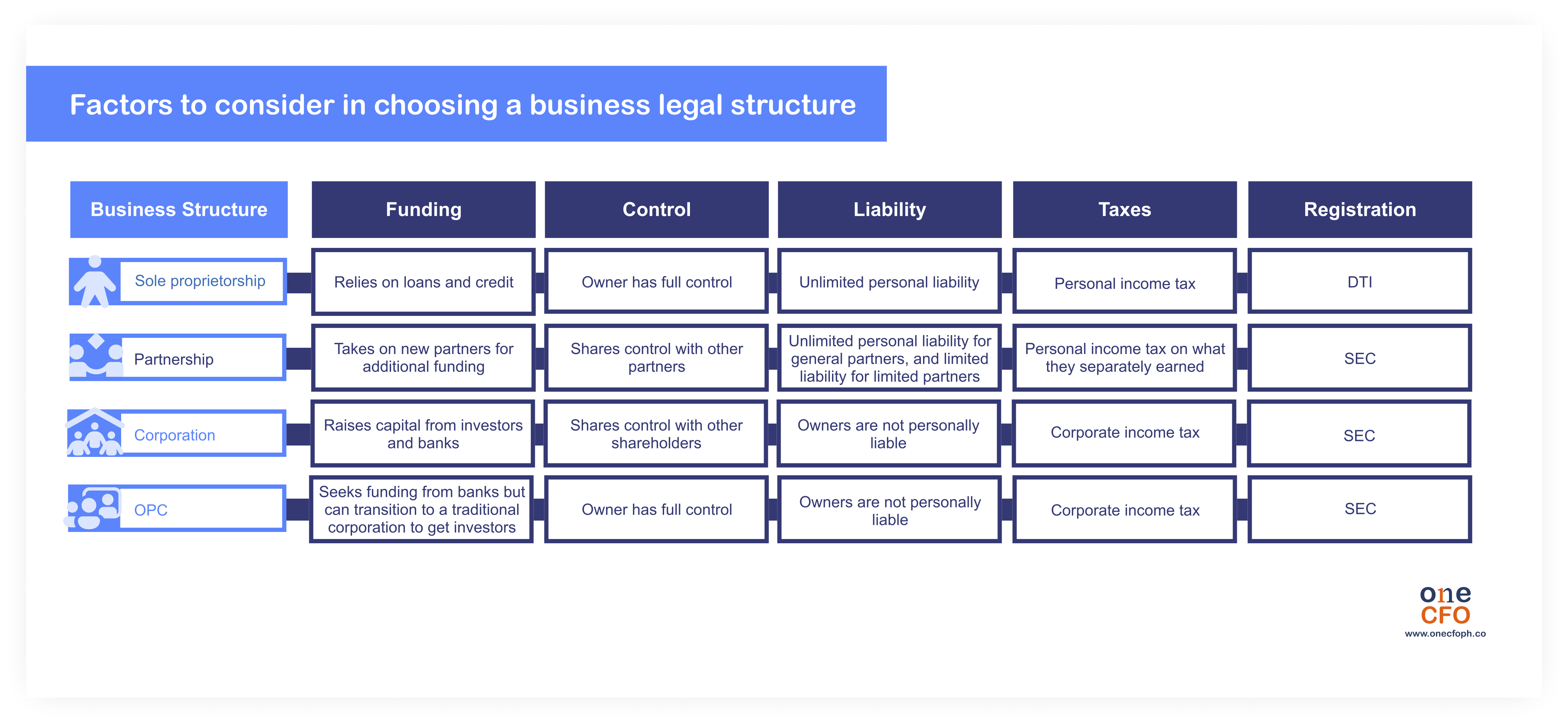
Seeking funding
If you want to grow and seek investors, start with a corporation where you can easily distribute shares to investors. Other structures can also seek funding differently but are less flexible than corporations.
Control over the business
Business owners who want full authority over the business should choose a sole proprietorship or OPC. These business structures allow the owner to operate independently and control the company.
Liability protection
Businesses like corporations and OPCs provide liability protection to their owners, which
means their assets are protected if the company suffers losses.
Partnerships may also offer the same protection if the person involved is a limited
partner.
Taxes
Each business structure has its tax compliance requirements and
rates. When assessing
potential income, it’s essential to check how the government taxes a business to see which
will be the cheapest.
Sometimes, being a sole proprietor can be beneficial because of the 8% tax rate. However,
once you exceed the VAT threshold, being taxed as a corporation might become cheaper since
it has lower graduated
tax rates ranging from 0% to 25%.
Ease of registration
A sole proprietorship is the easiest to register since DTI has fewer requirements than the
SEC.
However, suppose your business fits more for a partnership or corporation based on the
initial factors we mentioned. In that case, going through the hoops of complying with the
SEC requirements can be more beneficial.
Can you change your business legal structure?
The legal structure can change if it no longer aligns with your requirements as the business
expands.
While you can’t directly convert from a sole proprietorship to a corporation or OPC, and
vice versa, you can legally close your current business and open a new one to register the
new business entity.
Watch this video to learn more about your options in registering your business as well as
shifting to a different business structure:
Each business is unique, and knowing how you want to run your business will determine the
best structure for you. But if you’re still unsure of which business structure to choose or
confused with the requirements needed for each, we can help you!
OneCFO
can aid you
with the registration process and also help manage your business
finances, such as payroll, tax, and bookkeeping, so you can entirely focus on your growth.
Visit us at onecfoph.co or contact us at [email protected] to
learn how you can maximize our
financial services for your benefit.
Read our disclaimer here.